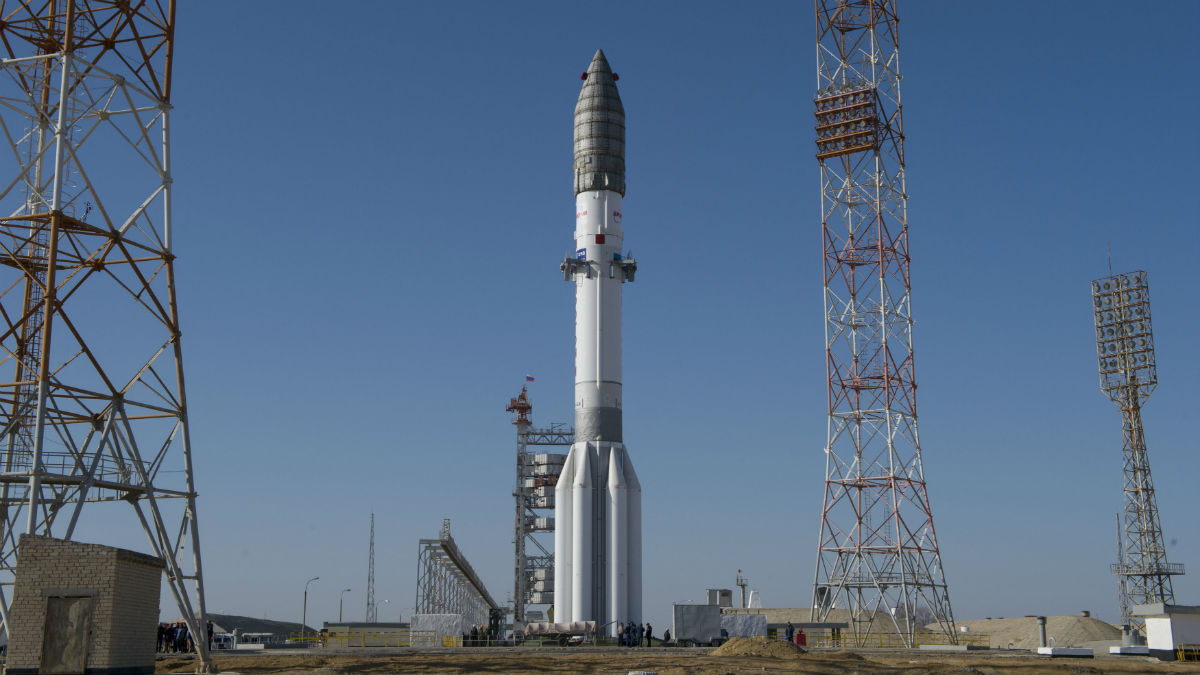Lift off for Europe and Russia's joint mission to Mars
Satellite's search for methane gas will show whether life existed on the red planet

A free daily email with the biggest news stories of the day – and the best features from TheWeek.com
You are now subscribed
Your newsletter sign-up was successful
European and Russian space agencies have launched a joint mission to Mars to search for gases that could indicate the existence of life on the Red Planet.
At 3.31pm local time (9.31am GMT), a Proton rocket carrying the ExoMars Trace Gas Orbiter satellite blasted into the atmosphere from the Baikonur Cosmodrome in Kazakhstan. It is due to reach Mars in October and, after a year getting into the correct orbit, 250 miles above the planet, will spend five years observing the land below.
The probe's delicate scientific instruments will examine the composition of gases in the Martian atmosphere, in particular the methane that the US's Curiosity rover has found present in tiny amounts. On Earth, the vast majority of methane is produced by living organisms. Scientists hope to learn more about how it is apparently produced and replenished on Mars, including the possibility of past or present living organisms on the planet.
The Week
Escape your echo chamber. Get the facts behind the news, plus analysis from multiple perspectives.

Sign up for The Week's Free Newsletters
From our morning news briefing to a weekly Good News Newsletter, get the best of The Week delivered directly to your inbox.
From our morning news briefing to a weekly Good News Newsletter, get the best of The Week delivered directly to your inbox.
Meanwhile, three days after its arrival, the satellite will release a small module, called the Schiaparelli, to land on the planet and carry out scientific experiments.
The successful touchdown of the Schiaparelli is vital to the second stage of the project, which will see the agencies attempt to land a rover on the planet in 2018.
Executing a successful landing has proven the undoing of many previous Mars missions and the trial lander is designed to demonstrate that new technologies – including a descent radar and improved computers – mean a future rover mission would have a greater chance of success.
For Roscosmos, the Russian space agency, the success of this mission would represent an end to a disheartening run of failures, says the BBC. The country has launched 19 missions to Mars since 1960, all but a handful of them outright failures. Its last Mars mission to go according to plan was a flyby and capsule landing in 1973.
A free daily email with the biggest news stories of the day – and the best features from TheWeek.com
-
 6 exquisite homes with vast acreage
6 exquisite homes with vast acreageFeature Featuring an off-the-grid contemporary home in New Mexico and lakefront farmhouse in Massachusetts
-
 Film reviews: ‘Wuthering Heights,’ ‘Good Luck, Have Fun, Don’t Die,’ and ‘Sirat’
Film reviews: ‘Wuthering Heights,’ ‘Good Luck, Have Fun, Don’t Die,’ and ‘Sirat’Feature An inconvenient love torments a would-be couple, a gonzo time traveler seeks to save humanity from AI, and a father’s desperate search goes deeply sideways
-
 Political cartoons for February 16
Political cartoons for February 16Cartoons Monday’s political cartoons include President's Day, a valentine from the Epstein files, and more
-
 Epstein files topple law CEO, roil UK government
Epstein files topple law CEO, roil UK governmentSpeed Read Peter Mandelson, Britain’s former ambassador to the US, is caught up in the scandal
-
 Iran and US prepare to meet after skirmishes
Iran and US prepare to meet after skirmishesSpeed Read The incident comes amid heightened tensions in the Middle East
-
 Israel retrieves final hostage’s body from Gaza
Israel retrieves final hostage’s body from GazaSpeed Read The 24-year-old police officer was killed during the initial Hamas attack
-
 China’s Xi targets top general in growing purge
China’s Xi targets top general in growing purgeSpeed Read Zhang Youxia is being investigated over ‘grave violations’ of the law
-
 Panama and Canada are negotiating over a crucial copper mine
Panama and Canada are negotiating over a crucial copper mineIn the Spotlight Panama is set to make a final decision on the mine this summer
-
 Why Greenland’s natural resources are nearly impossible to mine
Why Greenland’s natural resources are nearly impossible to mineThe Explainer The country’s natural landscape makes the task extremely difficult
-
 Iran cuts internet as protests escalate
Iran cuts internet as protests escalateSpeed Reada Government buildings across the country have been set on fire
-
 US nabs ‘shadow’ tanker claimed by Russia
US nabs ‘shadow’ tanker claimed by RussiaSpeed Read The ship was one of two vessels seized by the US military